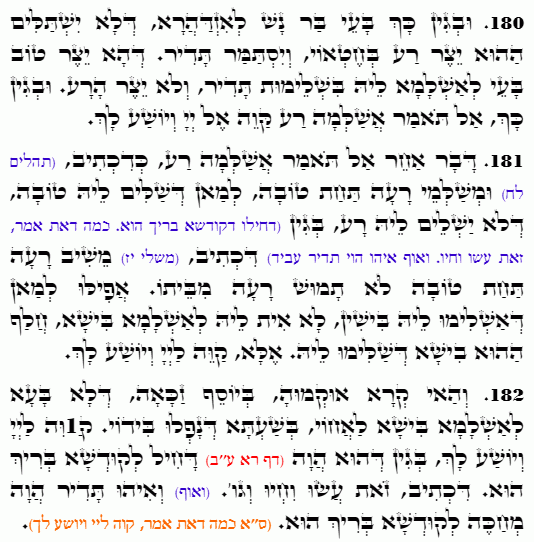Daily Zohar # 4737 – Miketz – Whoever repays evil for good, evil will not depart from his house
Daily Zohar 4737

Hebrew translation:
181. דָּבָר אַחֵר אַל תֹּאמַר אֲשַׁלְּמָה רָע – כַּכָּתוּב (תהלים לח) וּמְשַׁלְּמֵי רָעָה תַּחַת טוֹבָה. לְמִי שֶׁשִּׁלֵּם לוֹ טוֹבָה – שֶׁלֹּא יְשַׁלֵּם לוֹ רָע, מִשּׁוּם [יִרְאַת הַקָּדוֹשׁ בָּרוּךְ הוּא, כְּמוֹ שֶׁנֶּאֱמַר זֹאת עֲשׂוּ וִחְיוּ. וְגַם הוּא תָּמִיד עוֹשֶׂה] שֶׁכָּתוּב (משלי יז) מֵשִׁיב רָעָה תַּחַת טוֹבָה לֹא תָמוּשׁ רָעָה מִבֵּיתוֹ. אֲפִלּוּ לְמִי שֶׁהִשְׁלִימוּ לוֹ רָעוֹת, אֵין לוֹ לְהַשְׁלִים רָע תְּמוּרַת אוֹתוֹ הָרָע שֶׁשִּׁלְּמוּ לוֹ, אֶלָּא קַוֵּה אֶל ה’ וְיֹשַׁע לָךְ.
182. וְהַפָּסוּק הַזֶּה בֵּאֲרוּהוּ בְּיוֹסֵף הַצַּדִּיק שֶׁלֹּא רָצָה לְשַׁלֵּם רָע לְאֶחָיו בְּשָׁעָה שֶׁנָּפְלוּ בְיָדוֹ. קַוֵּה אֶל ה’ וְיֹשַׁע לָךְ, מִשּׁוּם שֶׁהוּא הָיָה יָרֵא מִן הַקָּדוֹשׁ בָּרוּךְ הוּא, שֶׁכָּתוּב זֹאת עֲשׂוּ וִחְיוּ וְגוֹ’. [וְגַם] וְהוּא הָיָה תָמִיד מְצַפֶּה לַקָּדוֹשׁ-בָּרוּךְ-הוּא. [כְּמוֹ שֶׁנֶּאֱמַר, קַוֵּה לַה’ וְיֹשַׁע לָךְ.]
.
Zohar Miketz
Continued from previous DZ
#180
Proverbs 20:22
“אַל תֹּאמַר אֲשַׁלְּמָה רָע קַוֵּה לַיהוָה וְיֹשַׁע לָךְ.”
“Do not say, “I will recompense evil”; Hope in YHVH, and He will save you.”
For this reason, a person must be careful not to empower the evil inclination (yetzer hara) through their sins. They must always guard themselves, for the good inclination (yetzer tov) requires strength with constant support through good deeds, not the yetzer hara. Therefore, “Do not say, ‘I will repay evil,'” because, through hatred, you will empower the left side and strengthen the yetzer hara. Instead, “Hope in Hashem, and He will save you.”
#181
Another explanation of “Do not say, ‘I will repay evil'” (Proverbs 20:22): It is like what is written, “וּמְשַׁלְּמֵי רָעָה תַּחַת טוֹבָה” “And those who repay evil for good” (Psalms 38:21). For one should not repay evil to someone who has done them good, as it is written:” מֵשִׁיב רָעָה תַּחַת טוֹבָה לֹא תָמוּשׁ רָעָה מִבֵּיתוֹ” “Whoever repays evil for good, evil will not depart from his house” (Proverbs 17:13). And even for someone who has done harm, one should not repay evil for the evil they caused. Instead, “Hope in Hashem, and He will save you” (Proverbs 20:22).
Notes:
Do not repay evil, whether for good or harm, but trust in Hashem for salvation and justice.
#182
This verse was explained regarding Joseph, a Tzadik, who did not seek to repay his brothers with evil when they were delivered into his hands. As it is said: “Do not say, ‘I will repay evil’; rather, hope in Hashem, and He will save you” (Proverbs 20:22). For Joseph feared the Holy One, Blessed be He, as it is written: “וַיֹּאמֶר אֲלֵהֶם יוֹסֵף בַּיּוֹם הַשְּׁלִישִׁי זֹאת עֲשׂוּ וִחְיוּ אֶת הָאֱלֹהִים אֲנִי יָרֵא” “Do this, and live; for I fear God” (Genesis 42:18). He always placed his trust in Hashem.
Notes:
Joseph’s conduct exemplifies the principle of not repaying evil with evil but instead relying on Hashem’s guidance and acting with fear of Hashem.
{||}

 Previous: Miketz
Previous: Miketz

